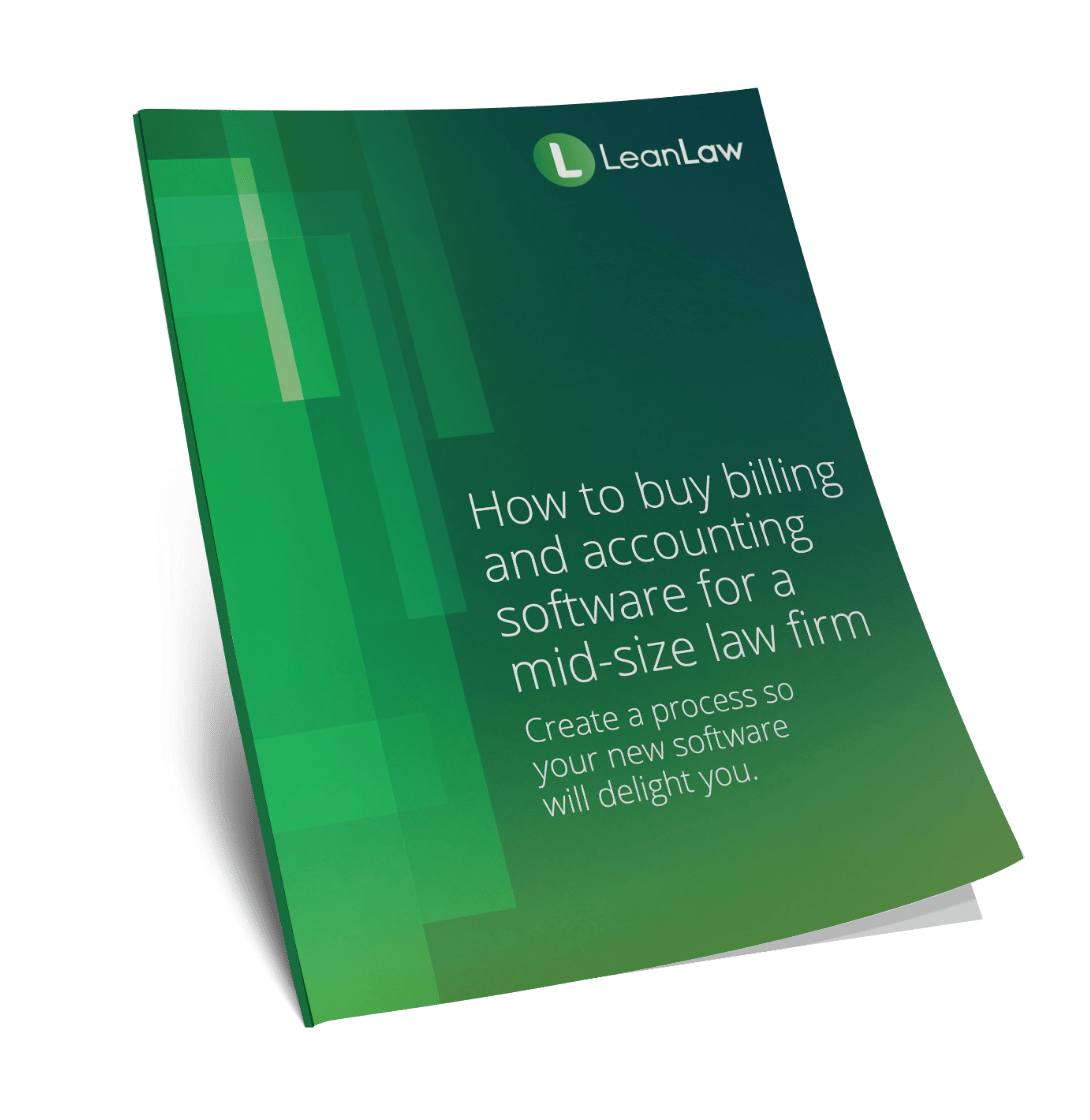
No one ever said the practice of law was going to be easy.
That said – you didn’t go to law school to be an accountant. Or a compliance officer.
As an attorney, your primary focus is on providing exceptional legal services to your clients and advocating for their best interests.
However, the reality is that running a law firm involves managing financial matters, including trust accounting and staying in compliance with all the strict regulations. That’s where the right software solution comes in.

Key Takeaways
- Trust accounting compliance is a vital part of ethical and legal law firm management and failure to do it correctly can have some serious consequences for law firms.
- Identifying some of the most common trust accounting errors will help to ensure you that your trust fund accounting is the best for your firm.
- Not only that but knowing what features you may be missing will make sure you choose a trust accounting software system that can fully integrate into your firm’s tech stack.
Running a law firm comes with its fair share of challenges and complexities, which is why having the right software can significantly ease the burden.
From billing and accounting to document management, having the right software can greatly streamline various aspects of running a law firm, including timekeeping, billing, document management, and trust accounting.
With efficient software solutions, you can automate manual tasks, improve productivity, eliminate errors and enhance accuracy.
You may not have gone to law school to crunch numbers or worry about compliance issues. But choosing the right software solutions will make it so you don’t have to.
Common Trust Accounting Errors and How to Steer Clear of Them
Trust accounting compliance is a crucial aspect of running a law firm, yet it can be highly complex and demanding.
As attorneys, you are entrusted with managing client funds held in a trust account, and any mishandling of these funds can lead to severe consequences.
To ensure the integrity of your trust accounting practices, it is essential to identify and address common errors that can occur in this area.
Let’s explore the five most common trust accounting errors and provide insights on how to avoid them.
1. Splitting trust account information across two systems
When data is scattered across multiple platforms or software, it becomes challenging to maintain accurate and up-to-date information. This can result in discrepancies in matter balances, difficulty in tracking trust funds, and potential compliance issues.
Monthly reconciliation and three-way reconciliation—when you cross-reference individual client ledgers, the trust ledger, and your bank statement—are key components to good and accurate trust accounting.
But using one accounting platform for reconciliation and reporting but another one to track retainer balances can cause errors to happen.
Consolidating trust accounting into a single, integrated software which will ensure that all trust-related data is stored in one place, making it easier to manage and maintain accurate records.

2. Not having accurate matter balances readily available
If you have your accounting and billing systems on separate platforms it can cause significant issues in trust accounting. Without up-to-date information on matter balances, it becomes difficult to track funds and determine available funds for specific matters.
This can lead to overspending, inadequate funds for disbursements, or misallocation of trust funds.
Implementing the best trust accounting software possible will provide you with real-time matter balances, allowing your firm to have a clear view of the financial status of each matter.
This enables better financial management, prevents potential errors, and ensures compliance with trust accounting regulations.

3. Letting retainers deplete without proper monitoring
Law firms that let a client’s retainer or trust account balance deplete is a common mistake that can lead to trust accounting problems.

Retainers are meant to be held in a trust account and should be available to cover legal fees and expenses related to specific matters.
Remember, they should never be mixed in with your firm’s operating account.
Failing to monitor retainers can result in overdrawn accounts, mixing of client funds, or failure to meet financial obligations.
Trust accounting software should offer robust features for retainer management, allowing your law firm to track retainer balances, automatically apply fees and expenses, and generate accurate invoices.
This ensures that retainers are properly managed, preventing issues related to depleted retainers and maintaining client trust.
4. Not using safeguards on trust accounts
Finally, another common error that many law firms find themselves making is not having the proper safeguards on their trust accounts.
Trust accounts are highly regulated, and it is crucial to have strong safeguards in place to prevent unauthorized access, fraud, or misuse of funds.
In order to avoid this problem, make sure you choose trust accounting software that offers security features such as user permissions, audit trails, and bank reconciliation tools to ensure the integrity and security of trust accounts.
By implementing these safeguards, law firms can demonstrate compliance with trust accounting regulations and protect client funds.

And…by addressing these common errors and leveraging the true power of good trust accounting software, law firms can streamline their operations, reduce compliance risks, and enhance overall financial management.

Step-By-Step Process for Attorneys & Law Firmsto Buy Law Firm Software
Understand who needs what and prioritize features as you investigate new software. Download Buyers Guide eBookLeanLaw: Your Firm’s Answer for Operating Trust Accounts Error-Free
LeanLaw is the ultimate solution for law firms seeking error-free management of their trust accounts. Built on QuickBooks for trust accounting, LeanLaw easily incorporates into your existing technology infrastructure.
With its robust features and intuitive interface, LeanLaw streamlines trust accounting processes and ensures compliance with regulations.

Let’s take a closer look at how LeanLaw’s legal trust accounting software can do this:
1. Mixing Trust and Operating Funds: One of the cardinal sins in trust accounting is commingling trust funds with the firm’s operating account. This can lead to serious ethical and legal violations that can cause your firm to be fined and even face possible disbarment, depending on the severity of the situation.
By using LeanLaw’s dedicated trust accounting software, you can establish strict segregation of trust account funds and operating funds, ensuring that client funds are kept separate and properly tracked.
2. Failing to Reconcile Trust Accounts: Regular reconciliation of trust accounts is vital to ensure accuracy and identify any discrepancies. Failure to reconcile trust accounts on a regular basis can result in errors going unnoticed and keep clients in the dark longer than they need to be when an error arises.
LeanLaw’s strong accounting software focuses specifically on accurate and easy-to-use trust accounting which will allow you to reconcile bank statements more efficiently and detect any discrepancies on your client trust accounts promptly.
Schedule a demo
3. Inadequate Record-Keeping: Accurate and comprehensive record-keeping is essential for trust accounting compliance and to make sure you are adhering to any and all trust accounting rules.
Failing to maintain proper records can make it challenging to track client funds, document transactions, and provide necessary reports.
Trust accounting software like LeanLaw streamlines record-keeping by automating the process and providing a centralized system for storing and accessing critical information.
4. Lack of Transparency: Transparency is crucial in trust accounting to establish trust and confidence with clients. Failing to provide clients with detailed, accurate, and timely reports on their trust funds can lead to disputes and loss of credibility.
Having the right trust accounting software will allow you to generate customized reports which will in turn provide your clients with clear and transparent information about their trust accounts.
5. Insufficient Controls and Auditing: Trust accounting requires robust controls and auditing measures to prevent unauthorized access, errors, or fraudulent activities.
Without proper controls and regular audits, the risk of financial mismanagement and non-compliance increases.
LeanLaw’s trust accounting software has those built-in controls, user permissions, and audit trails to ensure accountability and enhance security.
By addressing these common errors and leveraging LeanLaw’s technology-driven solutions, you can enhance your trust accounting practices, cut down on potential risks, and maintain compliance with trust accounting regulations.
Are you ready to take a proactive approach to trust accounting and choose LeanLaw as your preferred legal trust accounting software? If so, then reach out for a free demo today.
LeanLaw…less errors and more efficiency.




